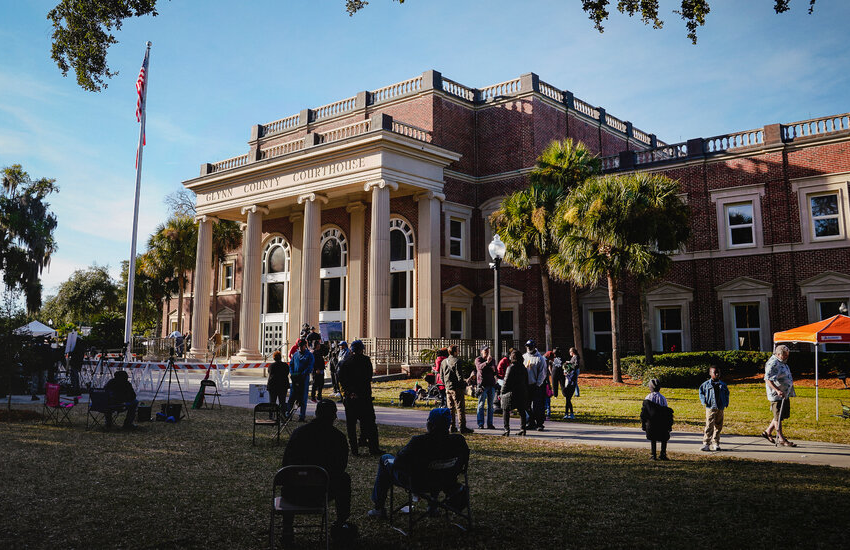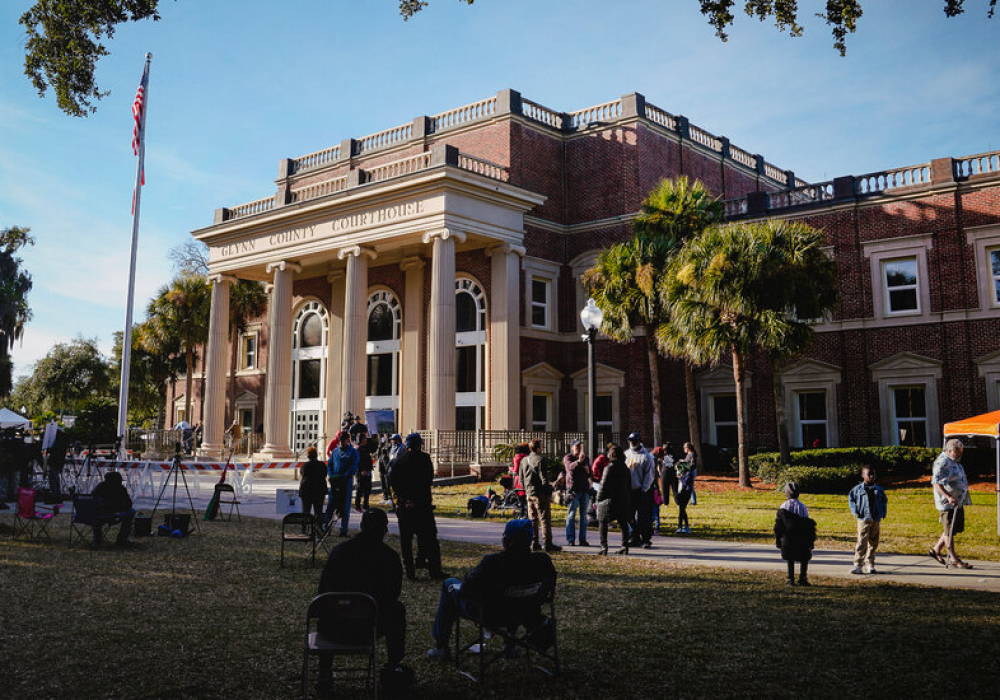BRUNSWICK, Ga. — A jury on Tuesday began deliberating on the fate of the three white men accused of murdering Ahmaud Arbery after hearing the final, impassioned argument of the lead prosecutor, Linda Dunikoski, who pushed back against the defense’s contention that the men had the legal right to pursue Mr. Arbery, and that the defendant Travis McMichael was acting in self-defense when he fatally shot him.
After days of fine-grained courtroom conversations, Ms. Dunikoski sought to boil the case down to its essence.
“He was trying to get away from these strangers, who are yelling at him — yelling at him, threatening to kill him — and then they killed him,” she said, referring to Mr. Arbery, a 25-year-old Black man who was unarmed when the men chased him. “Do you have any doubt that they committed all of the charges in the indictment?”
The defendants in the case — Mr. McMichael, 35; his father; Gregory McMichael, 65, and their neighbor William Bryan, 52 — have pleaded not guilty to charges of malice murder, felony murder, aggravated assault, false imprisonment and criminal attempt to commit false imprisonment. They have said they suspected Mr. Arbery of a series of break-ins in their subdivision of Satilla Shores, just outside the small coastal city of Brunswick, Ga., when they chased him through the neighborhood on a Sunday afternoon in February 2020.
Earlier this week, Ms. Dunikoski argued that the men had attacked Mr. Arbery “because he was a Black man running down the street.” Robert Rubin, a lawyer for Travis McMichael, has said the men were acting on a “duty and responsibility” to protect their families and neighborhood.
The jurors got the case midday Tuesday and headed home after 6 p.m., planning to resume deliberations on Wednesday morning. They have been hearing evidence and arguments since Nov. 5 and are now tasked with delivering a verdict in a case that helped fuel social justice protests across the United States in the spring and summer of 2020. More recently, the trial has been the focus of extensive cable television news coverage.
Both prosecutors and the defense have some potential advantages as the jury deliberates. A number of legal experts believe that the white defendants may benefit from the fact that the jury is made up of 11 white residents of Glynn County, Ga., and one Black resident.
The prosecution may benefit from having charged the men with felony murder. Unlike malice murder, prosecutors do not need to show “deliberate intention” to kill to prove felony murder. Rather, they need only to show that a felony was committed, and that someone died as a result. In this case, if the jury finds a defendant guilty of one of the lesser felonies, like aggravated assault, jurors would then have the discretion to also find that defendant guilty of felony murder.
For that reason, felony murder is “a very powerful tool in the prosecutor’s belt,” said Tanya Miller, an Atlanta criminal defense lawyer and former federal state and federal prosecutor. Often, Ms. Miller said, “jurors rightly or wrongly view felony murder a lesser charge than malice murder, because malice murder requires the intent to kill, and felony murder does not.”
Nov. 23, 2021, 4:14 p.m. ET
However, she noted, both malice murder and felony murder carry similar potential sentences. In this case, the men could face life in prison for felony murder alone.
Ms. Dunikoski’s rebuttal on Tuesday morning restated some of her earlier arguments as to why reliance on the state’s citizen’s arrest law, which has since been largely gutted, was not applicable in this case. She focused on the idea that the men did not witness Mr. Arbery committing a crime that day and also lacked the “immediate knowledge” that a crime had been committed — the two scenarios, she said, under which the law allowed for a citizen’s arrest.
She also rejected the idea that Mr. Arbery had been shot in self-defense.
“You can’t start something and claim self-defense,” she said. “And they started this.”
Ms. Dunikoski challenged the defense’s depiction of Mr. Bryan, who had filmed the shooting and was described by his lawyer as “absolutely superfluous and irrelevant to the tragic death of Ahmaud Arbery.”
Understand the Killing of Ahmaud Arbery
The shooting. On Feb. 23, 2020, Ahmaud Arbery, a 25-year-old Black man, was shot and killed after being chased by three white men while jogging near his home on the outskirts of Brunswick, Ga. The slaying of Mr. Arbery was captured in a graphic video that was widely viewed by the public.
The victim. Mr. Arbery was a former high school football standout and an avid jogger. At the time of his death, he was living with his mother outside the small coastal city in Southern Georgia.
The suspects. Three white men — Gregory McMichael, 67, his 35-year-old son, Travis McMichael, and their neighbor William Bryan, 52 — stand accused of murdering Mr. Arbery. They have also been indicted on federal hate crime charges. The men told authorities they suspected Mr. Arbery of committing a series of break-ins.
The trial. With an unsettling video set to play a starring role in court, the case bears similarities to that of Derek Chauvin, the former police officer found guilty of murdering George Floyd. The trial is likely to address issues such as vigilantism and the role racism played in the three defendants’ actions.
The jury. After an extraordinarily long process, 12 jurors in the case were selected. The jury, which is made up of residents of Glynn County, where more than a quarter of the population is Black, only includes one Black person.
She also spent significant time focusing on the other man who did not pull a trigger that day, Gregory McMichael. She noted Mr. McMichael’s statement that Mr. Arbery had been “trapped like a rat” before he was killed, citing it as an acknowledgment of false imprisonment. And she noted that Mr. McMichael had called Mr. Arbery an “asshole” shortly after the shooting.
“Malice, right there,” Ms. Dunikoski said of Mr. McMichael’s behavior.
The charge of malice murder is defined in Georgia law as causing a person’s death with deliberate intention, without considerable provocation, and “where all the circumstances of the killing show an abandoned and malignant heart.”
Ms. Dunikoski beseeched jurors to find the men guilty on the facts, and not because they were “good or bad” people.
“Nobody gets a free pass,” she said, adding that the case was “about holding people accountable and responsible for their actions.”




